Politics
Uzodimma inaugurates new cabinet, assigns portfolios to 24 Commissioners
Published
12 months agoon
By
Ekwutos Blog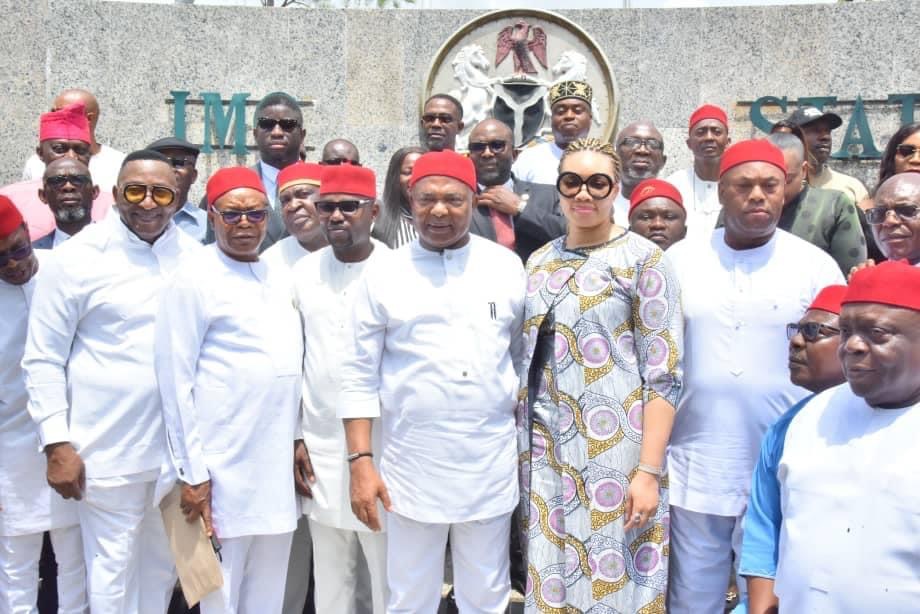
Governor of Imo State, Senator Hope Uzodimma has sworn in 24 Commissioners and inaugurated 19 Special Advisers who, with other top political appointees, will constitute members of the new expanded Executive Council as his second term adminstration enters full throttle.
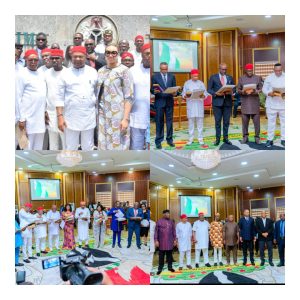
The Governor who administered the oath taking ceremony on the affected appointees at the new Executive Council Chamber Government House Owerri on Tuesday, April 30, 2024, also proceeded to immediately assign portfolios to the 24 Commissioners.
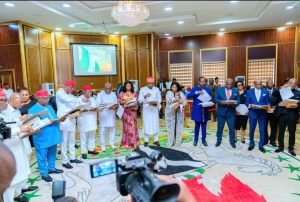
The Secretary to the State Government, Chief Cosmos Iwu, the Chief of Staff to the Governor, Barr. Nnamdi Anyaehie, the Deputy Chief of Staff (Administration), Chief Patrick Ekeji, the Deputy Chief of Staff (Operations), Barr. Sydney Emeka Agbor, the Deputy Chief of Staff (General Services), Chief Ferdinand Uzodimma, the Political Adviser and Head of Political Bureau, Barr. Enyinnaya Onuegbu and the Chief Press Secretary and Special Adviser, Media, Chief Oguwike Nwachuku, were the first set of senior political appointees who were led in the oath taking rituals.
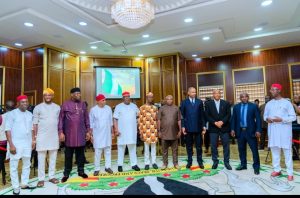
In his remarks after the swearing in and inauguration ceremonies were completed, Governor Uzodimma hinted that more appointments will still be made in due course to fill vacant positions in some critical ministries.
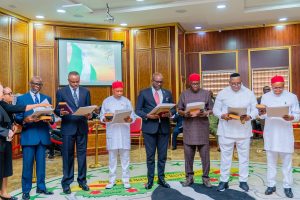
However, in the interim, he assigned the position of the Commissioner for Lands to his Office as part of efforts to restore sanity in the said ministry where, of late, Imo people have increasingly lost confidence in the handlers of the ministry, occasioned by avoidable demeanour.
Governor Uzodimma urged all the Executive Council members to use their positions and inter-personal skills and relationships to ensure success in their ministries, agencies and departments and on the job assigned to them in general.
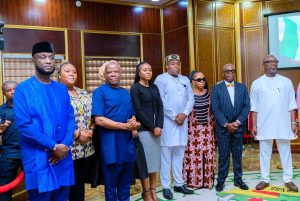
He reminded them that his reelection for a second tenure places enormous responsibilities and great expectations on the government and the appointees, hence there should not be room for excuses and complacency.
“The performance of the second tenure must be better than the first term,” he insisted.
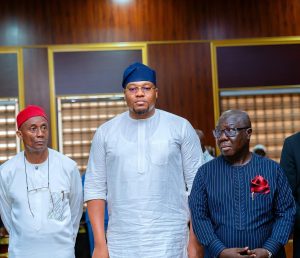
Governor Uzodimma once more brought the issue of personal integrity of the appointees to the fore, noting that how Imo people feel about them is equally important to him.
He insisted that they must “conduct themselves with decorum and with all sense of responsibility.”
The Governor reiterated the importance of the oath of office the appointees took and reminded them that “it is not a mere ritual but a serious act that places huge responsibilities on your shoulders.”
He therefore reminded them that as public officers they must “behave differently bearing in mind that the public will beam their searchlight individually and collectively,” on them.
He advised on the need to realise that their new position requires tough approaches where only those who persevere will triumph.
Governor Uzodimma told the audience that the appointees were chosen based on their individual merit, hence their “integrity and performance on the job is at stake and a lot is expected of them from Imo people and Government.”
He recalled his administration’s abhorrence to corruption and commended them for agreeing with his injunction to ensure total realisation of the Shared Prosperity 3R Government following lessons they learnt from their two-day retreat, and asked them to endeavor to “work the talk.”
As part of measures to monitor performance, the Governor reminded the appointees that a Monitoring and Evaluation Unit had been established in his Office and that there will be quarterly assessment and evaluation of each of them.
“There is no time to waste, as all eyes must be on the ball,” he enthused.
In a vote of thanks on behalf of the appointees, the Attorney General and Commissioner for Justice, Barr COC Akaolisa thanked the Governor for finding them worthy and inviting them to “share in the glory of a government and a Governor that is doing very well.”
He promised that their team will “bring honour and not shame to their family” and that they will, to the best of their ability, give their best to ensure they don’t disappoint the expectations of the Governor, Government and the people of Imo State.
The event was attended by prominent Imo personalities, including the wife of the Governor, Barr. Chioma Uzodimma,Speaker of the State House of Assembly, Rt. Hon Chike Olemgbe, former Governor of Imo State, Chief Ikedi Ohakim, Head of Service, Barr. Raymond Ucheoma, Principal Secretary to the Governor, Dr. Irene Chima, the All Progressives Congress Chairman in Imo State, Dr. Macdonald Ebere, the Chairman of Imo State Council of Traditional rulers, HRH Eze EC Okeke, the Chairman of Imo State Council of Elders, HRM Eze Cletus Ilomuanya, former APC Chairman in Imo State, Chief Marcom Nlemigbo, business mogul and APC leader in Imo State, Chief Tony Chukwu, HRH Eze Oliver Ohanweh, among other important dignitaries.
Some relatives of some of the appointees were also around to witness the occasion.
Oguwike Nwachuku
Chief Press Secretary and Media Adviser to the Governor
April 30, 2024
You may like
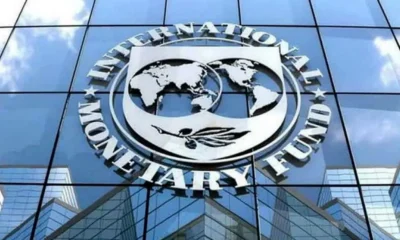

Resolve trade tensions inimical to global economic growth – IMF tells countries
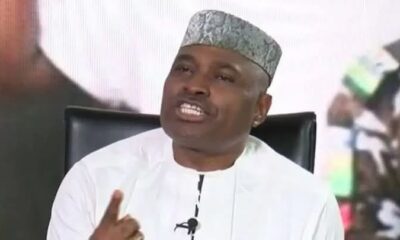

Kenneth Okonkwo Predicts Regret for PDP Defectors, Says 2027 Election Will Be People vs APC
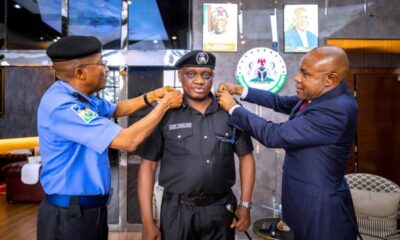

Governor Mbah decorates CSO with new rank


NAF airlifts Airforce students to their destinations across Nigeria
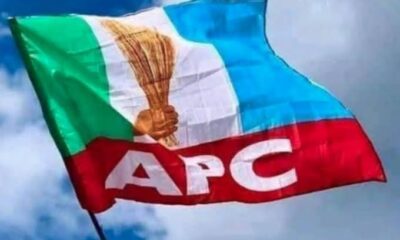

APC CANDIDATES FOR 2025 NIGER STATE LOCAL GOVERNMENT COUNCIL ELECTION
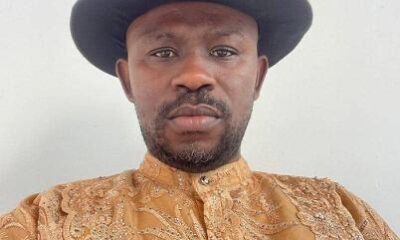

Kyari brought structure, stability to NNPCL – NDYC
Politics
Kenneth Okonkwo Predicts Regret for PDP Defectors, Says 2027 Election Will Be People vs APC
Published
2 hours agoon
April 25, 2025By
Ekwutos Blog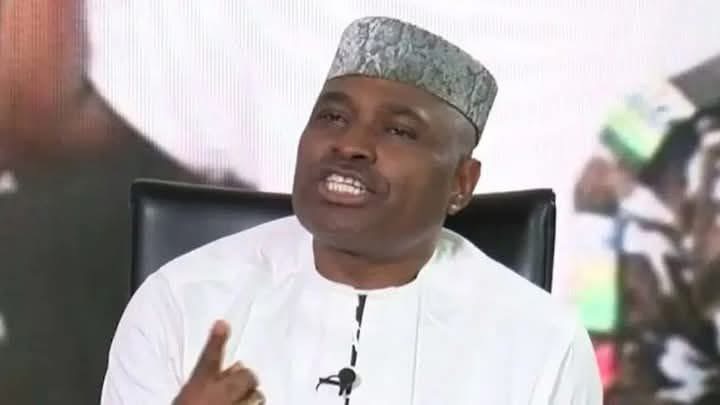
Nollywood veteran and political commentator, Kenneth Okonkwo, has expressed strong disapproval of the recent wave of defections from opposition parties to the ruling All Progressives Congress (APC), declaring that those making the move will come to regret it within a year.
Okonkwo’s remarks come in the wake of the high-profile defection of Delta State Governor, Sheriff Oborevwori, his deputy Monday Onyeme, and former Governor Ifeanyi Okowa, along with several commissioners and Peoples Democratic Party (PDP) stakeholders, who all officially joined the APC on Wednesday.
Reacting via a post on X, the actor-turned-politician did not hold back, accusing the defectors of abandoning their parties for selfish reasons—chiefly to evade anti-corruption scrutiny and secure personal benefits rather than serve the Nigerian people.
According to him, the ruling party’s alleged incompetence and corrupt practices will worsen economic conditions, increase hunger and suffering, and ultimately lead to widespread discontent among citizens.
“Mark my words,” Okonkwo wrote, “Before one year from now, these spineless, shameless, and corrupt members of the opposition parties who are running into the APC now to escape EFCC and for stomach infrastructure at the expense of the Nigerian economy and Nigerian people will regret their actions.”
He further asserted that the ruling APC’s misgovernance would be so glaring that the 2027 general election would no longer be a typical party contest but a showdown between the Nigerian people and the APC government.
Politics
APC CANDIDATES FOR 2025 NIGER STATE LOCAL GOVERNMENT COUNCIL ELECTION
Published
11 hours agoon
April 24, 2025By
Ekwutos Blog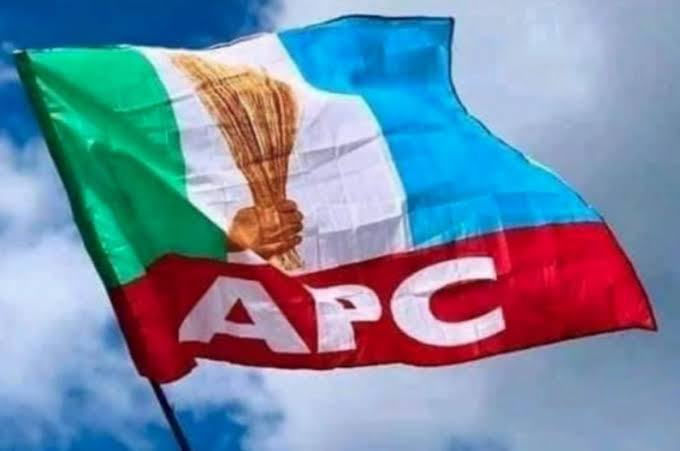
1. Hon. Sayuti Ibrahim Halilu – Again
2. Hon. Iliyasu Zakari – Agwara
3. Hon. Usman Manko Mohammed – Bida
4. Hon. Abdullahi Mohammed Nasiru – Borgu
5. Hon. Abdullahi Usman Laka – Bosso
6. Hon Mustapha Mohammed Jibril – Chanchaga
7. Hon. Usman Ndana – Edati
8. Hon. Hassan Mohammed – Gbako
9. Hon. Jonah Ishaya – GURARA
10. Hon. Isah Baba Bida – Katcha
11. Hon. Lawal Yusuf – Kontagora
12. Hon. Abdullahi Umar Evuti – Lapai
13. Hon. Mohammed Alfa Ma’ali – Lavun
14. Hon. Mamuda Mamman – Magama
15. Hon Aliyu Baga Mohammed – Mariga
16. Hon. Umar Jibril Igade – Mashegu
17. Hon. Jibril Abdullahi Muregi – Mokwa
18. Hon. Aminu A. Najume – Munya
19. Hon. Aminu Umar Yandayi – Paikoro
20. Hon. Ayuba Usman Katako – Rafi
21. Hon Abdullahi Yakubu Dukku – Rijau
22. Hon. Isyaku Bawa – Shiroro
23. Hon Isyaku Bawa Naibi – Suleja
24. Hon. Danladi T. Ijah – Tafa
25. Hon Mohammed Ibrahim Lokogoma – Wushishi
Politics
ANALYSIS: With Traore, Burkina Faso can get governance right, achieve developmental aspirations
Published
11 hours agoon
April 24, 2025By
Ekwutos Blog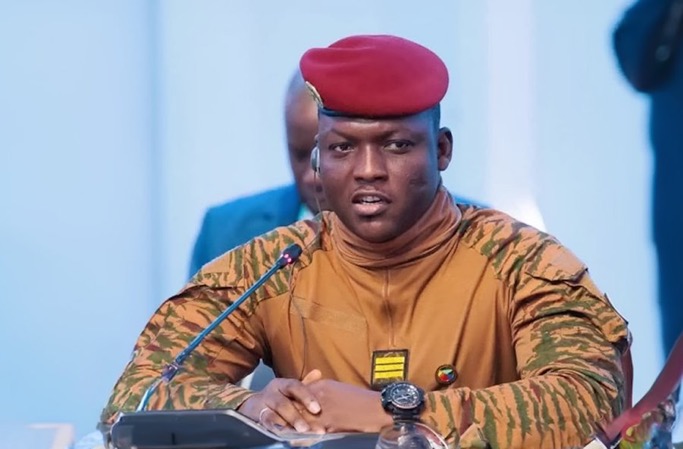
The challenge will be translating Burkina Faso’s rich mineral resources and promising economy into stability and development.
At 36, Burkina Faso’s Ibrahim Traoré is the world’s youngest president, in stark contrast to Africa’s average leader age of 63. He took office in September 2022 after overthrowing Paul-Henri Damiba, who had ousted former president Roch Kaboré earlier that year.
The foundations of the country’s coup administration have been rocky. Last week, the military government survived another apparent coup attempt; one among several since Mr Traoré, an army captain, came to power.
In his inaugural statement, Mr Traoré said Burkina Faso faced an emergency, citing crises in security, defence, healthcare, social action and infrastructure. He pledged to combat terrorism and adhere to the transition timetable agreed with the Economic Community of West African States (ECOWAS), which aimed to restore democratic rule by 1 July 2024.
However, Burkina Faso has since withdrawn from ECOWAS, forming instead the Alliance of Sahel States with Mali and Niger – countries also run by post-coup administrations. Under Burkina Faso’s new transition plan, Mr Traoré may remain in his position until at least 2029.
His popularity has soared since his ascension to power. At President John Mahama’s inauguration in Ghana on 7 January, Mr Traoré received the loudest applause of all 21 African heads of state. This showed not only his popularity but the trend of tolerance for military rule in Africa, especially among the youth.
Afrobarometer reports that almost two-thirds of Burkinabé believe the army should intervene when leaders abuse their power. Likewise, 66 per cent accept military rule, up from 24 per cent in 2012. The fact that the survey was conducted at a time when the country was under military rule portrays a general acceptance of the regime.
However, Mr Traoré’s popularity goes beyond acceptance of military rule. He has embarked on radical reforms that resonate with many Burkinabé. These include reversing his predecessor’s salary increase for government officials while he remainson his military captain earnings.
As part of efforts to take ownership of mineral resources, Mr Traoré has nationalised two gold mines and stopped exporting unrefined gold to Europe, instead inaugurating a national gold refinery expected to process 150 tonnes annually.
Other significant achievements include establishing the National Support Center for Artisanal Cotton Processing, building a new airport, and considerable agricultural investment.
While these are noble attempts to industrialise Burkina Faso, the country must not fall into the usual traps of inefficiencies, corruption and mismanagement that characterise most African state-owned enterprises.
Further, Mr Traoré has rejected financial assistance from the International Monetary Fund and World Bank, insisting the country can develop without the West’s loans and conditionalities. For some, this is a demonstration of Africans handling their own affairs. For the youth, Mr Traoré’s regime is a chance to show what young people can achieve. But for most ordinary Burkinabé, the priority is simply improving their daily living conditions.
At a time of increasing global uncertainty and a decline in international aid, Africa must strive for self-reliance and control of its resources. Like many African countries, Burkina Faso is blessed with natural resources that, if properly managed, could transform citizens’ lives.
The country has mineral resources and produces substantial quantities of gold, zinc, copper, manganese, phosphate and limestone. It also has reserves of diamonds, bauxite, nickel and vanadium, most of which remain largely unexploited.
The country has made gains. Gross Domestic Product (GDP) (in market exchange rate) increased from $3.2 billion in 1990 to $18.3 billion in 2023, and extreme poverty declined from 83 per cent to 27.7 per cent in the same period. But significant challenges remain.
According to the 2023/2024 Human Development Report, Burkina Faso is classified as having low human development and is ranked 185th out of 193 countries on the Human Development Index. Itplaced 149th out of 167 countries on the 2024 Sustainable Development Goals Index, and on the Multidimensional Poverty Index, 64.5 per cent of the population is multidimensionally poor.
However, the economy holds significant promise. Recent research by the Institute for Security Studies’ African Futures and Innovation team shows that Burkina Faso’s economy could grow at an average rate of 8 per cent from 2025 to 2043.
This would translate into an additional GDP per capita of $1,120 above a business-as-usual forecast – and reduce income poverty to only 2.6 per cent of the population. This means an extra 2.4 million Burkinabés could be lifted out of poverty by 2043.
The study identified governance reforms as critical to unlocking the country’s development potential. Indeed, good governance could raise GDP per capita by an extra $240 above a business-as-usual forecast, lifting 500,000 additional Burkinabé out of extreme poverty.
For this, Mr Traoré must lead the country in overcoming political instability, violent extremism and weak institutions. Institutional and structural reforms are needed to enhance security, accountability, public sector efficiency and governance inclusion.
The immediate priority is addressing terrorism, which resulted in the loss of about 40 per cent of the country’s territory, undermining the state’s authority and ability to deliver public services, as thousands of schools and health facilities are closed in those areas. The UN Refugee Agency estimates that over two million people are internally displaced, and those needing humanitarian assistance increased by 35 per cent between 2022 and 2023.
Next should be building strong institutions and strengthening existing ones to improve public sector efficiency and combat corruption. Local governments must be empowered with the resources and capacity to implement development programmes tailored to communities’ needs.
In the medium term, the country must transition into constitutional rule to ensure the political stability and legitimacy needed to drive economic growth. This would also enhance investor confidence, allowing Burkina Faso to attract the foreign direct investment needed for its development. The African Union, civil society organisations and development partners should support the 60-month transition plan to ensure a smooth transition to democracy.
This is not the first time such a charismatic figure has emerged on Africa’s political scene. Many revolutionary leaders started the same way but later deviated from the course as they clung to power. In Ghana, 32-year-old Jerry Rawlings, nicknamed ‘Junior Jesus’, emerged in late 1979 in a bloody revolution to fight corruption and sanitise the country’s political system. But after 19 years in power, his legacy was mixed.
With a young, strong, charismatic leader, Burkina Faso has a chance to get its governance right and achieve its developmental aspirations. This could be a lasting legacy for Traoré’s regime.
Enoch Randy Aikins, Researcher, African Futures and Innovation, Institute for Security Studies (ISS)
(This article was first published by ISS Today, a Premium Times syndication partner. We have their permission to republish).

Resolve trade tensions inimical to global economic growth – IMF tells countries

Kenneth Okonkwo Predicts Regret for PDP Defectors, Says 2027 Election Will Be People vs APC

Governor Mbah decorates CSO with new rank
Trending

 Trending6 months ago
Trending6 months agoNYA demands release of ‘abducted’ Imo chairman, preaches good governance
- Business6 months ago
US court acquits Air Peace boss, slams Mayfield $4000 fine

 Politics6 months ago
Politics6 months agoMexico’s new president causes concern just weeks before the US elections
- Entertainment6 months ago
Bobrisky transferred from Immigration to FCID, spends night behind bars
- Entertainment6 months ago
Bobrisky falls ill in police custody, rushed to hospital

 Politics6 months ago
Politics6 months agoRussia bans imports of agro-products from Kazakhstan after refusal to join BRICS

 Politics6 months ago
Politics6 months agoPutin invites 20 world leaders
- Politics1 year ago
Nigerian Senate passes Bill seeking the establishment of the South East Development Commission.

